The Experience of a First World War Soldier: a new school resource from Perth & Kinross Archive
30 APRIL 2020
Hi everyone, this week’s guest blog post comes from Sarah Wilcock, Assistant Archivist at Perth & Kinross Archive.
Sarah joined the Perth & Kinross Archive team in September 2016. Prior to that she was an arts graduate and had been working as a Cultural Assistant in East Dunbartonshire where she was first introduced to Archives. Through this work she was inspired to pursue a career in the sector and in 2015 she attended the University of Glasgow to attain a masters degree in Information Management and Preservation.
Hello, my name is Sarah Wilcock and I am the Assistant Archivist for Perth & Kinross Archive. I have recently created a new school resource based on our collections and I wanted to take this opportunity to tell you a bit more about it.
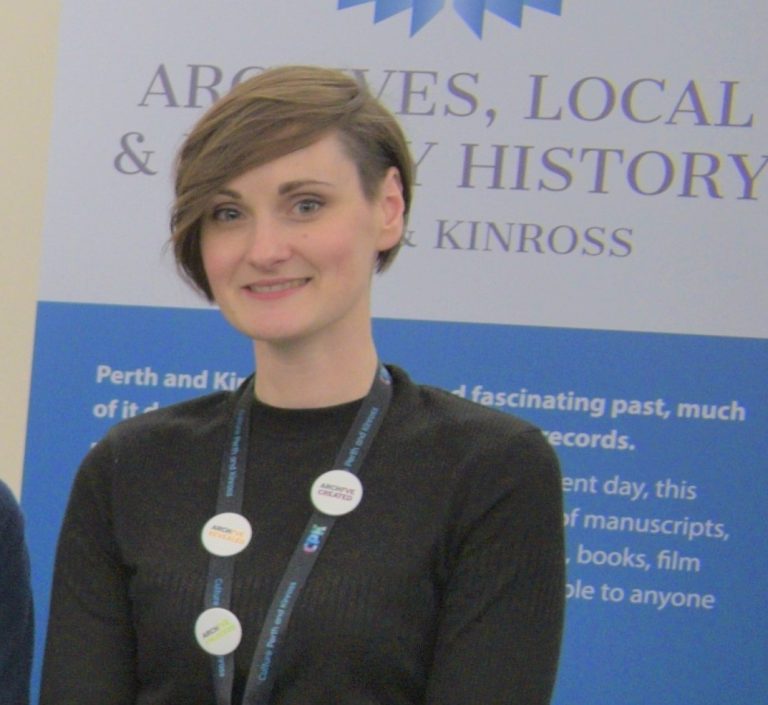
Perth & Kinross Archive, Assistant Archivist Sarah Wilcock (me)
Getting started
As the development of this resource coincided with the 2014-18 First World War commemoration period, and many school curriculums support the topic ‘Scotland and the Great War’, it seemed like a good idea to focus the resource on one of our First World War collections. I selected the personal papers of Private John Alexander Veitch (MS323), a young soldier from Pitlochry, as it contains 201 of John Alex’s letters, many of which were written during his basic training and service on the Western Front.
John Alex Veitch (b. 1897) was working as a civil servant for the Inland Revenue in London when war broke out in 1914. In February 1917 he enlisted in the London Scottish Regiment and moved to Winchester to receive his basic training at Hazeley Down camp. In July he, and his fellow soldiers, boarded a boat for France and from there he travelled to the Belgian Front. During his time away from home for study, work and active service he maintained regular correspondence with his family in Pitlochry. New experiences such as parades, gas mask tests, watching aerial bombardments, sleeping in dugouts, removing lice from clothing, dining with local Belgian families and preparing to go ‘over the top’ are all described in his letters from Winchester, France and Belgium, providing a wonderful insight into daily life for a soldier.
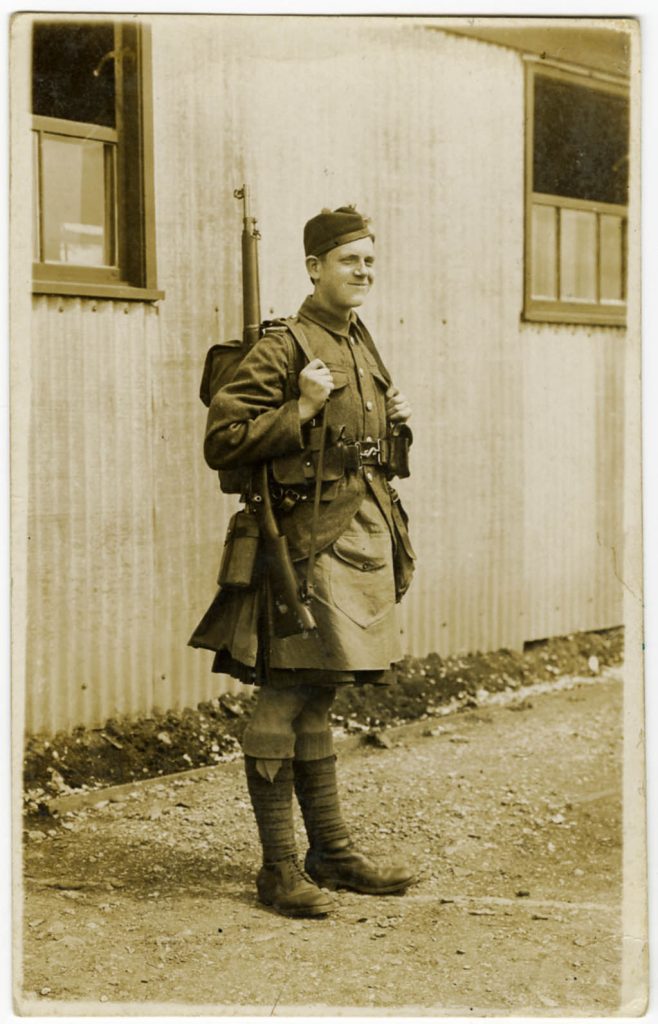
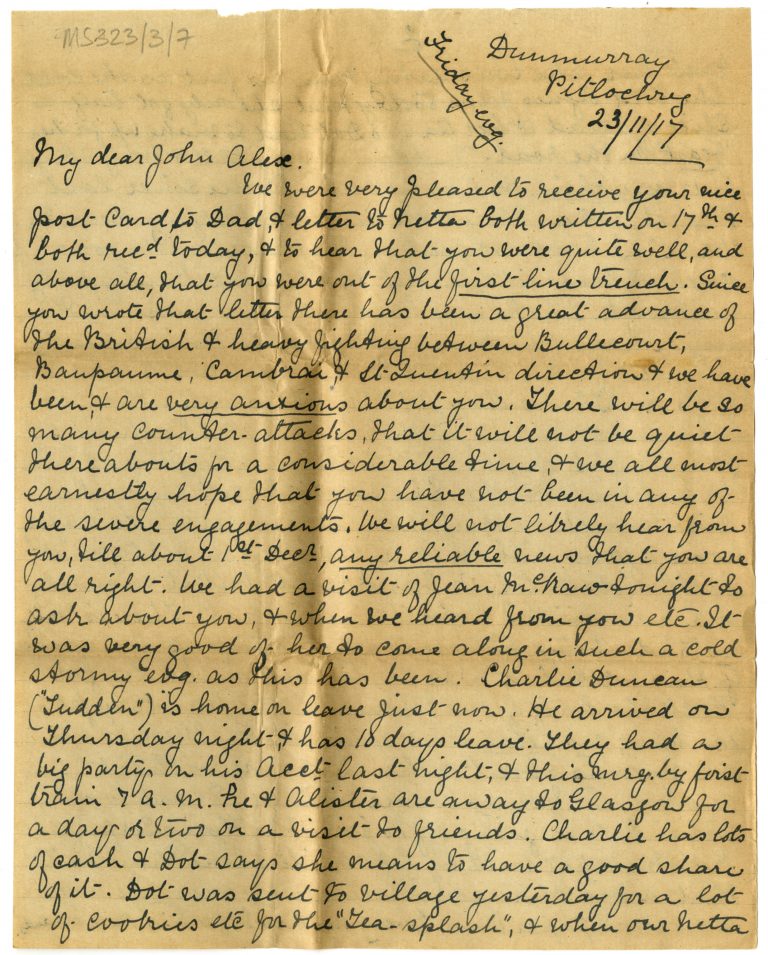
Top: Photograph of John Alex Veitch, 1917 (Perth & Kinross Archive, MS323/3/9/46)
Bottom: Letter to John Alex from his mother, 1917 (Perth & Kinross Archive, MS323/3/8
Forward, the Independent Labour Party’s Scottish newspaper, reported that those gathered included ‘doctors and dock labourers and rebels of every possible brand from mild peace advocates to the wildest of revolutionaries.’
The rich content of these letters makes them a fantastic resource for introducing school pupils to a first-hand account of a soldier’s experience during WWI. Using just a few of the letters I created a series of activities that required the pupils to apply critical and interpretive thinking, group discussion and dramatic characterisation to emotionally engage with John Alex’s situation. Through this process they would not only learn more about life at war from a primary source but also the value of archives within the learning experience and in our wider society.
The resource is aimed at S3 History pupils and in order to get the most out of the records without causing too much disruption to the school schedule I divided it into four Units to be delivered over four separate sessions.
I was delighted when two schools signed up to participate in the pilot of the resource. St John’s RC Academy in September 2019 and Pitlochry High School in February 2020.
Delivering Unit 1: John Alex Veitch
The first session was held at the AK Bell Library, home of the archive, and included a twenty minute introduction to archives and a tour of the archive strong room. This provided the pupils with context for the records they were about to work with; where they are held, how they are looked after and the importance that we place on the collections. It also gave them insight into what an Archivist is and the role we play in the care and accessibility of records. It was then time to get stuck into the records themselves…
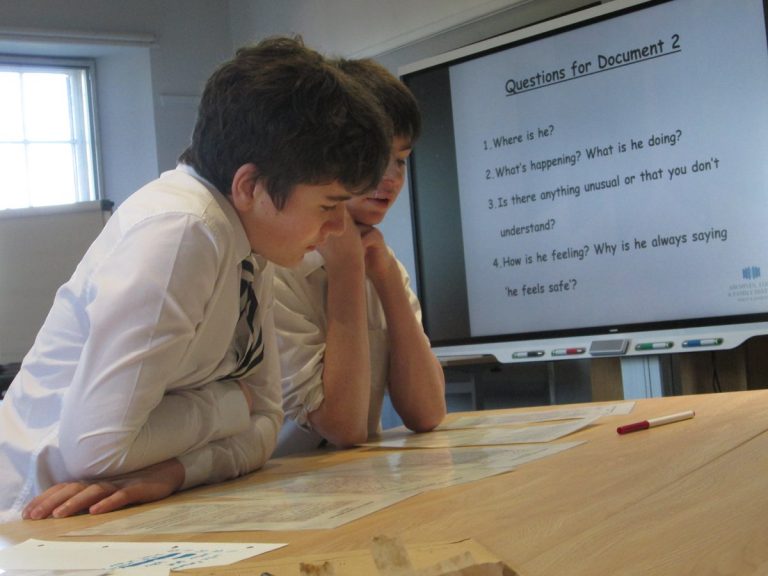
Pupils from Pitlochry High School reading transcripts of John Alex’s letters (image courtesy of Pitlochry High School)
Reading through some of John Alex’s letters, written to his mother back home in Pitlochry, the pupils began to discuss their thoughts surrounding the descriptions of his situation, the language he uses, the purpose of writing the letters, the value in the information provided as a primary source and how it relates to their own understanding of what life was like for the soldiers.
The teachers and I were delighted to see the pupils engaging with these activities and some of their observations were very well considered.
“I enjoyed looking at the old letters because we got to see how people used to communicate and how language has changed.” – St John’s RC Academy pupil.
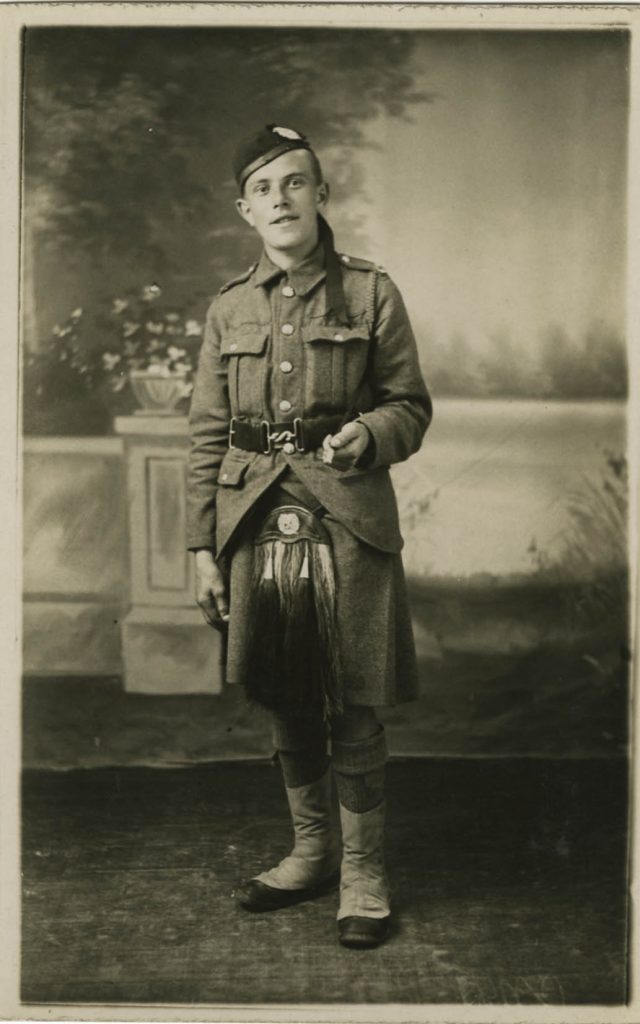
John Alex Veitch, 1917 (Perth & Kinross Archive, MS323/3/3)
Next up was perhaps the most daunting activity, a dramatic recreation of John Alex’s official photograph. I was quite nervous about this as I was completely unsure of how the pupils were going to react, but fortunately they all seemed to throw themselves into it. Their task was to recreate the taking of John Alex’s picture with pupils taking on the role of John Alex, his mother, the photographer, the photographer’s assistant and another soldier waiting his turn.
The purpose of the activity was to consider what was going through the minds of each character. In an attempt to understand and empathise with each individual and the experience that war placed upon them in that moment, the pupils were asked to vocalise their interpretation of each character’s thoughts. It also demonstrates the different ways that we can interpret records and how we might apply them to new creative outputs.
“I also enjoyed how some drama skills were added into the workshop because it gave us another way to engage in the task.” – St John’s RC Academy pupil

Pitlochry High School pupils pose as John Alex and his photographer (image courtesy of Pitlochry High School
To round things up, as a class, the pupils fed back on what they had learned about John Alex so far. Up to this point the pupils had been working from facsimiles of the documents, at the end of the workshop they had the opportunity to look at the original items.
“One thing I found interesting was looking at the different documents of information because seeing the real thing gives more emotion and interest than notes from a booklet” – St John’s RC Academy pupil.
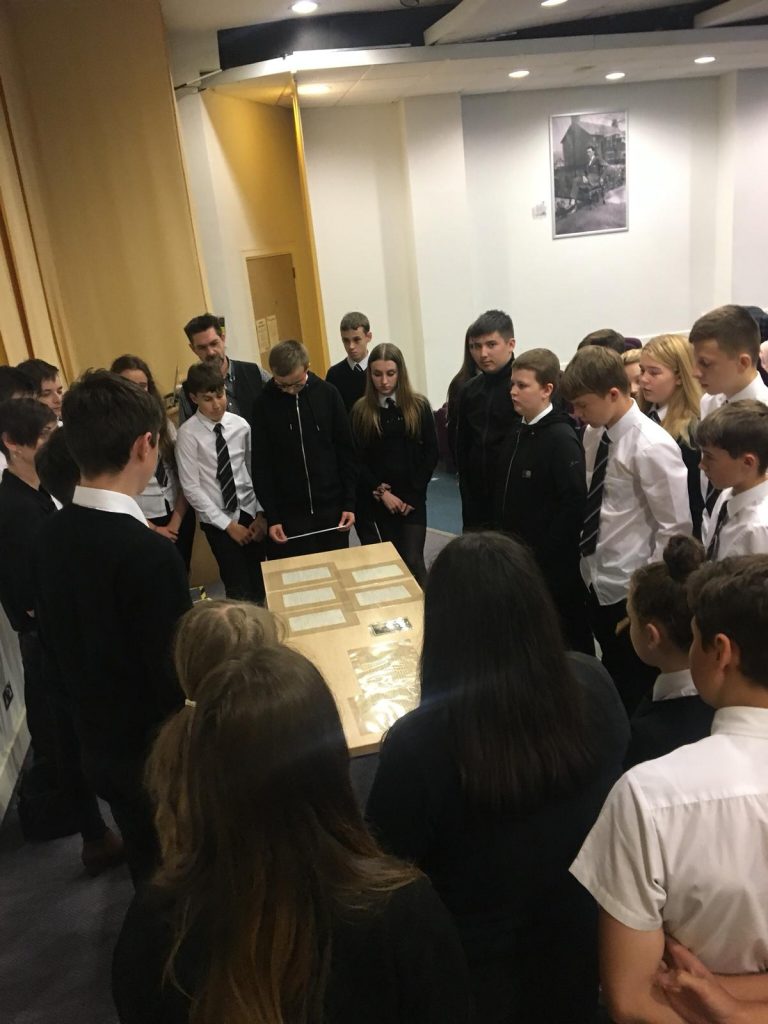
St John’s RC Academy pupils viewing the original Veitch documents.
Unit 2: Trench Life and Unit 3: Troop Movement and the Battle of Cambrai
These two sessions were delivered by the teachers in their classrooms with resources and lesson plans supplied by the archive. The pupils took a closer look at John Alex’s descriptions of the trenches and compared these with other soldiers’ accounts.
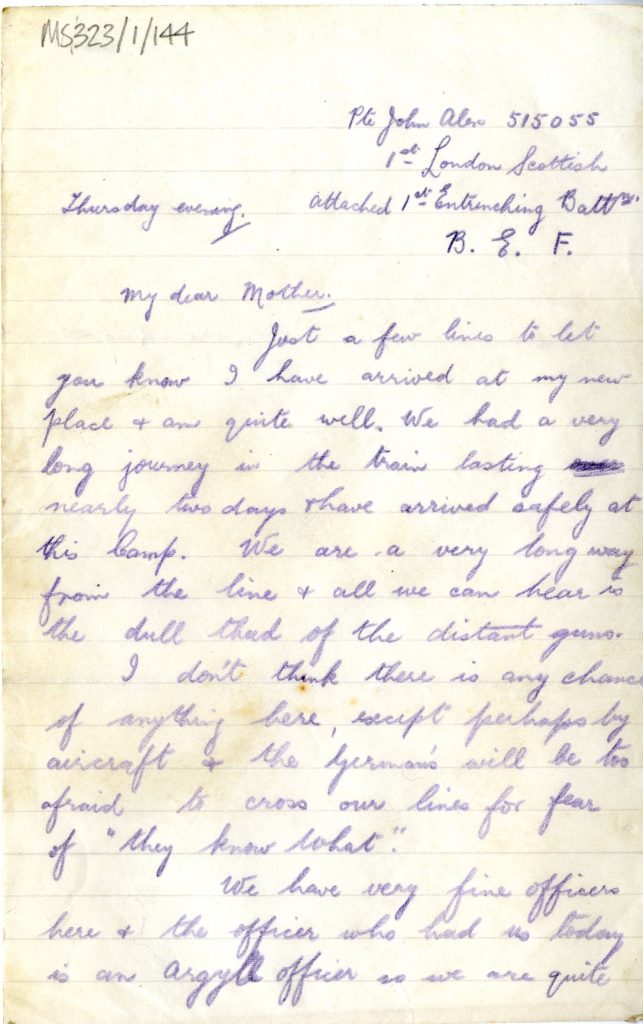
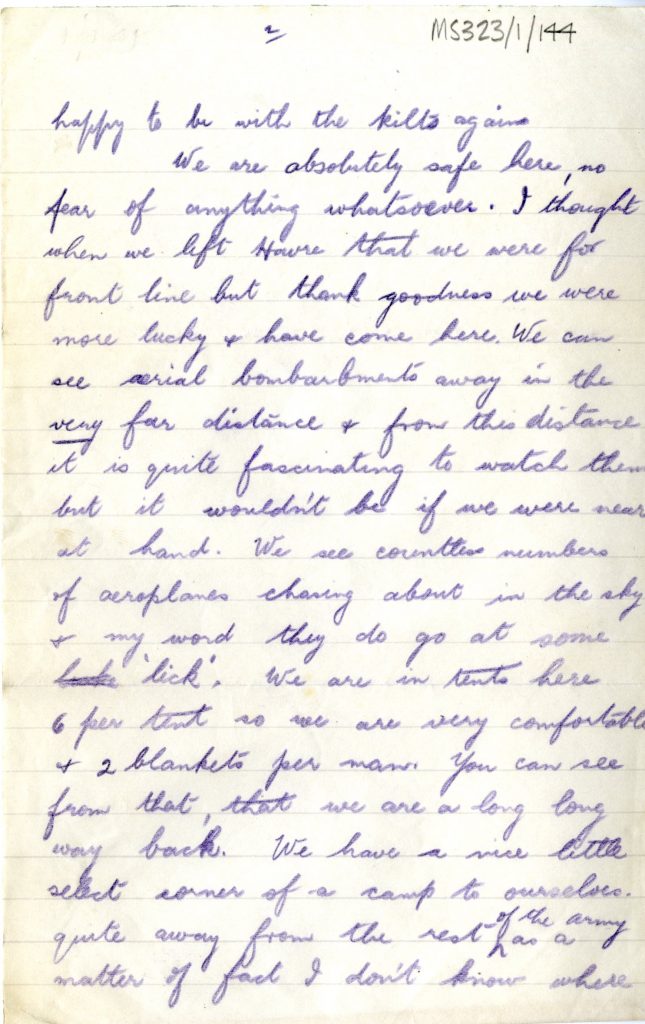
Letter from John Alex to his mother, July 1917 (Perth & Kinross Archive, MS323/1/144)
They then looked at the events of the Battle of Cambrai which began on the 20 November 1917 and saw the largest tank offensive by the British forces that the world had ever seen up to that point. Although the use of the tanks, alongside the element of surprise, saw a massive advancement into enemy territory for the British forces the German army quickly recovered and pushed back. When the battle finally ended on 6 December 1917 little ground had been gained by either side, but both had seen many casualties and losses of life. This was to be John Alex’s first major offensive and pupils were asked to consider how he might have been feeling in the lead up to the battle and whether his letters at the time reflected an accurate account of what he was facing.
Unit 4: The Fate of John Alex Veitch
For the final session I caught up with the pupils in their classrooms. We summed up everything that they had discovered about John Alex so far and discussed their thoughts on the resources from Units 2 and 3. Many concluded that John Alex was holding back and painting a better picture of events in order to shield his family back home from the realities of war. They also surmised that censorship would likely have factored into what he could and could not say.
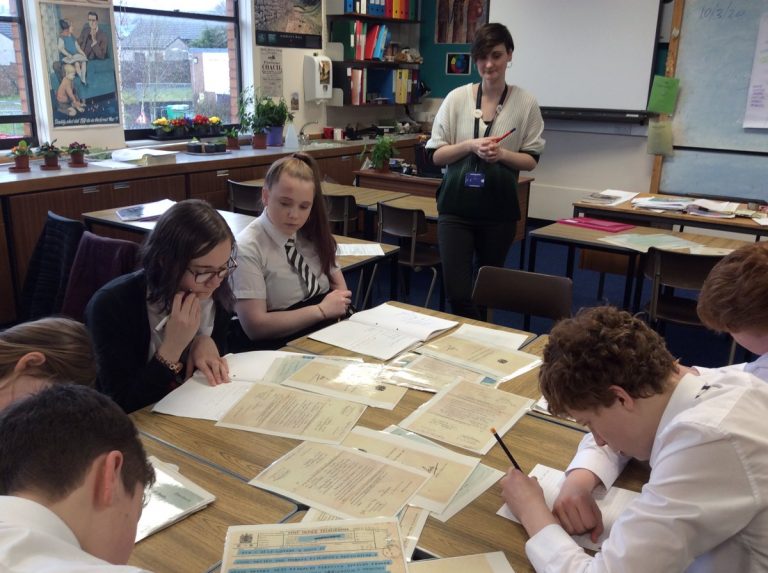
Discussing the fate of John Alex with Pitlochry High School pupils (image courtesy of Pitlochry High School)
The final records we looked at were those telling the fate of John Alex Veitch. A telegram, death certificate and notice from the crown told his family that he had died of his wounds, sustained during the Battle of Cambrai, on 25 November 1917 at the age of twenty. After looking through these documents the pupils gave me their final feedback. When asked to sum him up in a few words Pitlochry pupils came up with brave, Scottish, caring, selfless, worried and optimistic.
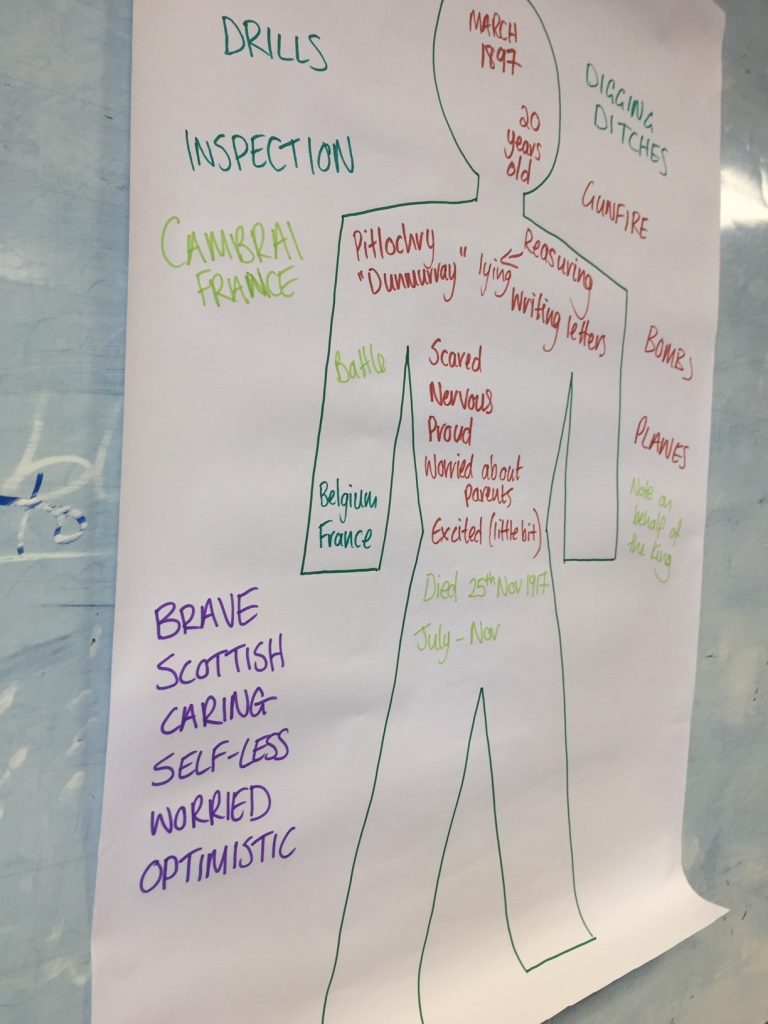
Role on the Wall feedback sheet for Pitlochry High School pupils.
It was so heartening to see that the pupils had engaged so fully with just a few records from this collection. They were able to apply logic and reasoning to how they could interpret the information to form their own understanding of a young man who lived over 100 years ago.
“It is a way of showing pupils where the sources that we used in class hail from and I think they love the thought of the documents which they are handling being in the possession/in the hands of the authors who wrote them. It brings them closer to the subject and makes it more relevant.” – Miss Senkel, St John’s RC Academy
The value of archives
To finish up we discussed the role that archives play in the understanding of our past. All agreed that there was value in them and that they had added to their learning experience.
“Pupils really benefit seeing where the resources are stored as it plants a seed for the future when they might use Archives again. It really brought things to life. They were also interested to learn what an archivist does (links really well with Developing Young Workforce).” – Ms Robertson, Pitlochry High School
Positive feedback
I am absolutely delighted at the success of our first Archive Education Resource. I have learnt a lot in the process of putting it together. As I am not a teacher, I was quite nervous about working with the pupils to ensure that it was delivered successfully, however, their engagement and eagerness to participate has greatly boosted my confidence in working with schools in the future. I am very excited to develop more topics to add to our offer.
As an added bonus the pupils from Pitlochry High School went to view their school war memorial to see if they could find John Alex’s name. Being able to look at the archives of a man from their own town provided a unique experience for them. When asked to feedback what they enjoyed most about the Resource one Pitlochry pupil replied,
“Learning about someone from Pitlochry specifically”
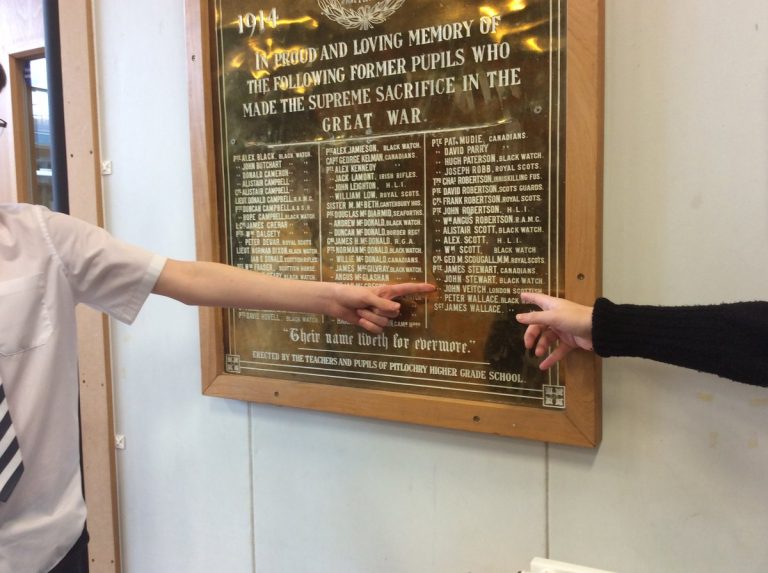
Pitlochry pupils point to John Alex Veitch on the school war memorial (image courtesy of Pitlochry High School)